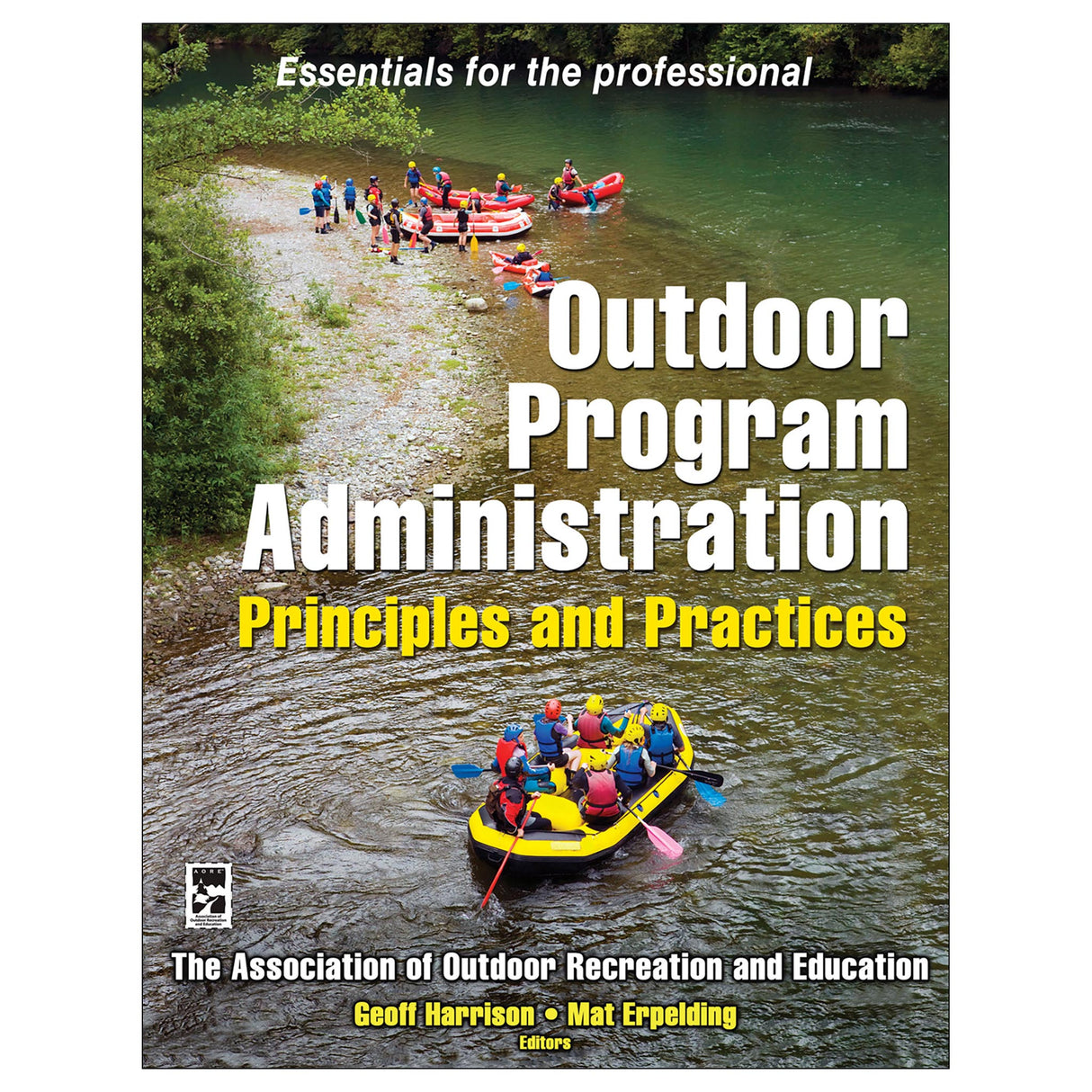Outdoor Program Administration PDF
Principles and Practices
Author: Geoff Harrison, Mat Erpelding
$77.95 CAD
Access Duration: 10 Years
Outdoor recreation programming is a growing and diverse field that requires administrators to be ready to work in complex and multidisciplinary environments. Outdoor Program Administration: Principles and Practices will help both seasoned and new administrators—as well as students and emerging professionals—flourish in various settings, including university, military, government, commercial, and nonprofit organizations.
You’ll learn the best contemporary administrative strategies and practices from veteran professionals from the Association of Outdoor Recreation and Education (AORE). The AORE authors provide extensive coverage of all aspects of administrative duties and responsibilities from a diverse organizational setting.
Outdoor Program Administration: Principles and Practices guides you in developing and sustaining programs in outdoor recreation settings across public, private, and nonprofit sectors. You will reap the benefits of the experience shared by the AORE authors, who also provide questions and critical thinking exercises that will enhance the materials and deepen your understanding.
This reference explores all the issues pertinent to being a successful outdoor program administrator. The book has four sections: Outdoor Program Foundations, Program Design and Implementation, Staffing Considerations, and Facilities and Programs. Topics you’ll delve into include
• designing and developing programs;
• risk management and legal considerations;
• budgeting and financial operations;
• marketing and land access (permits);
• environmental stewardship;
• staff recruitment, supervision, training, and assessment; and
• management of indoor climbing walls and challenge courses.
Outdoor Program Administration: Principles and Practices presents material that will help you improve your administrative skills and enhance the programs you oversee. As such, it’s an essential book for your professional library.
Part I. Outdoor Program Foundations
Chapter 1. The Outdoor Program Administrator
Mat Erpelding and Geoff Harrison
Outdoor Program Administration Defined
Outdoor Program Administrator Defined
Skill Sets for Outdoor Program Administrators
Administrative Competence
Minimum Competencies for Outdoor Program Administrators
Acquiring Skills
Professional Maintenance
Administrative Challenges
Summary
Chapter 2. History of Outdoor Recreation in the United States: An Outdoor Administrator’s Perspective
Steven P. Guthrie, Bryan J. Cavins, and Jerome Gabriel
National Events Set the Stage for Emergence of Outdoor Recreation: 1825–1890
The Beginnings of a Profession: 1890–1920s
Outdoor Recreation Evolves and Grows: 1920s–1960s
Adventure Programming Emerges: 1960s–1990
Adventure Programming Today (1990–present)
Summary
Chapter 3. Dimensions of Outdoor Recreation Programs
Todd Bauch and Steve Hutton
Three Service Sectors of Outdoor Recreation Programs
Common Programmatic Types
Common Facilities or Resources of Outdoor Programs
Outdoor Program Administrative Structures and Models
Summary
Chapter 4. The Future of Outdoor Program Administration
Laurlyn K. Harmon and Susan L. Johnson
Evolving Participant Characteristics
Staffing
Professionalization of the Field: Standards, Certifications, Accreditation
Youth and the Outdoors
Technology and the Outdoors
Sustainability
Collaborations and Partnerships
Outcome Assessment
Summary
Part II. Program Design and Implementation
Chapter 5. Designing and Developing Outdoor Recreation and Education Programs
Todd Miner and Heidi Erpelding-Welch
Vision
Mission Statement
Strategic Plan
Sustainability
Dealing With Change: Evolve to Survive and Thrive
Summary
Chapter 6. Administrative Risk Management
Mat Erpelding and Geoff Harrison
Terms and Definitions of Risk Management
Creating a Comprehensive Risk-Management Plan
Summary
Chapter 7. Legal Considerations in Outdoor Recreation
Brent Wilson and Tracey Knutson
Negligence
Legal Definition (Elements) of Negligence
Negligence and Negligence Related Theories of Liability
Defenses Against Negligence
Role of Insurance in Legal Liability Matters
Summary
Chapter 8. Budgeting and Financial Operations of Outdoor Programs
Tim J. Moore and Geoff Harrison
Budget Components
Budget-Development Strategies
Forecasting Expenses and Revenue
Summary
Chapter 9. Marketing Outdoor Programs
John McIntosh and Geoff Harrison
Marketing Basics
Identifying the Market
Marketing Mix
Developing a Marketing Plan
Branding
Marketing Methods
Summary
Chapter 10. Access and Permitting for Use of Public Lands
Rachel M. Peters
Outdoor Programs on Public Lands
Permitting Defined
Management Agencies and Regulations
Permitting Tips
Summary
Chapter 11. Environmental Stewardship
Whitney Ward and Will Hobbs
History of Environmental Stewardship in the United States
Major Impacts of Recreation Today
Applied Environmental Stewardship
Integration of Environmental Stewardship and Recreation
Summary
Chapter 12. Developing Policies, Procedures, and Guidelines for Outdoor Programs
Mat Erpelding, Curt Howell, and Brien Sheedy
Characteristics of Quality Policy, Procedure, and Guideline Documents
Considerations Specific to Developing Policies and Procedures
Developing Administrative Policies and Procedures
Developing Field Policies and Procedures
Summary
Part III. Staffing Considerations
Chapter 13. Staff Recruitment and Supervision
Jeff Turner and Leigh Jackson-Magennis
Human Resource Planning
Staff Selection
Staff Supervision
Summary
Chapter 14. Staff Training
Bruce Saxman and Tom Stuessy
Needs Assessment
Hiring and Staff Training
Initial Standardized Training
Mentoring
Staff-Training Assessment
Mechanisms for Training Assessment and Evaluation of Staff
Staff-Training Designs: Integrated Training Model
Activity-Specific Training
Staff Appraisal
Summary
Chapter 15. Staff Assessment
Mark Wagstaff and Jenny Kafsky
The Basics and Purpose of Staff Assessment
An Effective Environment for Assessment
Assessment Criteria
Assessment Tools
An Effective Assessment System
Summary
Part IV. Facilities and Programs
Chapter 16. Rental Operations
Rob Jones
Planning
Purchasing
Rental Center Operations
Summary
Chapter 17. Indoor Climbing Walls
John Bicknell and Guy deBrun
History of Artificial Climbing Walls
Climbing Wall Facilities and Construction
Climbing Wall Activities
Climbing Wall Management
Summary
Chapter 18. Challenge Course Management
Christina Carter Thompson and Adam Bondeson
Challenge Terms
History
Challenge Course Program Design and Outcomes
Primary Influences on Challenge Programming
Challenge Course Facilities
Designing and Choosing a Course
Bidding Process
Building Process
The Challenge Course Administrator
Organizational Support and Resources
Summary
Chapter 19. Land-Based Programming
Curt Howell
Incident Prevention and Incident Response
Cost Analyses
Determining Learning Outcomes
Risk Management
Backpacking
Climbing
Caving Programs
Mountaineering
Ski Programs
Cycling
Summary
Chapter 20. Water-Based Programming
Andy Reimers and Chris Stec
Incident Prevention and Incident Response: Needs Assessment
Water-Based Programming: Flat Water
Water-Based Programming: Moving Water and Whitewater Venues
Water-Based Programming: Open Water
Summary
Chapter 21. Special Events Programming
Brent Anslinger and Amy Anslinger
Special Event Options
Risk Management for Special Events and Competitions
Assessing and Planning Your Event
Staffing
Managing the Event
Developing Timelines for Successful Events
Putting the Planning Into Motion
Summary





